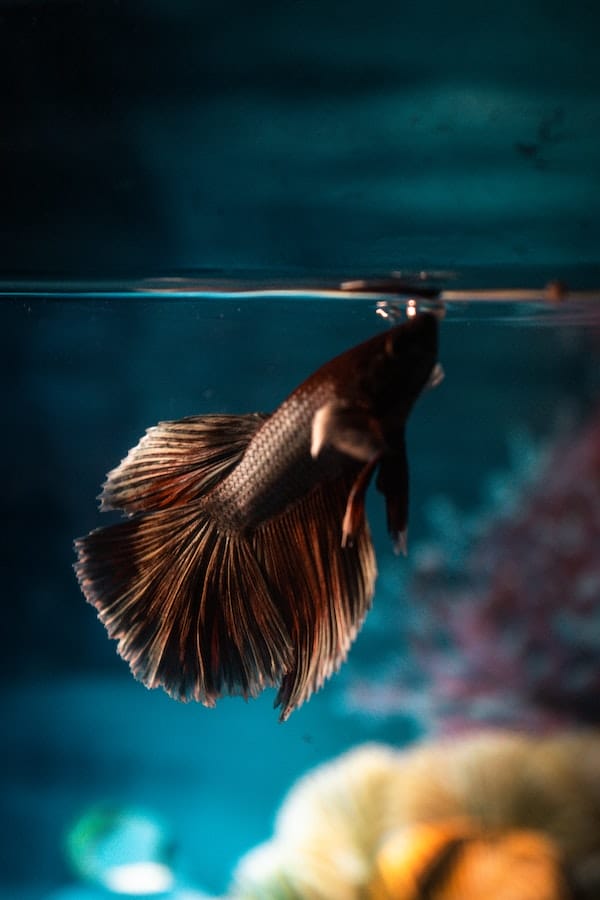
Welcome to our blog post all about the intriguing sleep patterns of betta fish.
These captivating and enchanting creatures have won over the hearts of fish enthusiasts worldwide with their stunning colors and graceful swimming.
In this article, we will delve into the captivating realm of betta fish sleep, discovering how these aquatic beauties rest and how you can provide them with a cozy and restful sleep environment.
How Betta Fish Sleep
Betta fish, also known as Siamese fighting fish, have unique sleeping habits that differ from other fish. Here is a list of how betta fish sleep and an explanation of each point:
Labyrinth organ
Betta fish possess a remarkable adaptation known as the labyrinth organ.
This specialized organ enables them to breathe air directly from the surface, allowing them to survive in environments with low oxygen levels.
The presence of the labyrinth organ is not only vital for their overall survival but also relevant to their sleeping behavior.
Surface breathers
Betta fish possess a unique characteristic as surface breathers, distinguishing them from many other fish species.
They exhibit a natural inclination to swim up to the water’s surface and take in gulps of air.
Interestingly, this behavior persists even during their sleep.
As surface breathers, bettas have the ability to access atmospheric oxygen, allowing them to supplement their respiration.

Resting position
During their sleep or rest periods, it is common for betta fish to position themselves near the water’s surface.
They often adopt a floating or hanging position, appearing motionless as if in a peaceful trance.
This particular resting posture is a natural behavior observed in bettas, emphasizing their affinity for staying close to the surface.
Vertical orientation
Betta fish have a fascinating sleeping habit where they sometimes adopt a vertical orientation.
During their rest periods, they position themselves with their heads pointing upwards and their bodies hanging downwards.
This unique posture serves a practical purpose, as it enables them to effortlessly access the water’s surface for breathing.
Surface napping
Betta fish have an intriguing behavior known as surface napping, where they lay down for brief yet soothing rests close to the water’s surface.
During these periods, they might seem unmoving, however, they remain alert and responsive to their surroundings.
Reduced activity
During their rest, betta fish will quite often show diminished movement levels.
They become less active, showing slower movements and swimming less frequently.
Moreover, their reactions to external stimuli become limited during this time of rest.
It is during their sleep that bettas enter a condition of relaxation, conserving their energy and allowing their bodies to revive.
Eye movement
In any event, during their resting state, betta fish show eye movement while they sleep.
This fascinating behavior shows that they hold a specific level of awareness of their surroundings, even in their sleep.
It suggests that bettas keep a sense of watchfulness, in any event when their bodies are at rest.
Sleep cycle variations
Sleep patterns among betta fish can vary, with some might sleep more during the day, while others may primarily rest around nighttime.
These variations in sleep cycles can be impacted by factors like lighting conditions, temperature, and the unique behaviors of the fish.

How to Create a Comfortable Sleeping Environment for Betta Fish
To ensure your betta fish gets a soothing rest, establishing a comfortable environment is important. Here are a few tips to assist you with giving the best circumstances:
Tank setup
While making a permanent spot for your betta fish, it’s vital to provide them with a tank of the proper size that allows them to swim and rest easily.
Ensure that the tank is spacious enough to accommodate their regular movements.
Enhance their environment by incorporating plants, caves, or other hiding places where your betta fish can find comfort and relaxation.
Lighting
Maintaining a consistent light-dark cycle for your betta fish is important to mimic their natural environment. Just like us, they thrive on routine.
Consider using a timer to simulate day and night cycles, allowing them to experience variations in natural light.
This helps establish a sense of normalcy and promotes their overall well-being.
Water quality
Ensuring excellent water quality is critical for the well-being of your betta fish, allowing them to rest and revive in a healthy environment.
Practice it all the time to consistently monitor the water parameters and conduct routine water changes depending on the situation.
This helps maintain optimal water conditions and advances their overall well-being.

Ambient noise
It’s vital to minimize loud noises and vibrations nearby your aquarium as they can disturb the sleep of your betta fish.
Making a peaceful and quiet environment will assist your fish with having a solid sense of reassurance and calm.
By reducing disturbances and keeping a peaceful environment, you provide your betta fish with ideal circumstances for continuous rest and relaxation.
Feeding schedule
To guarantee a healthy sleep routine for your betta fish, trying not to feed them just before bedtime is recommended.
Instead, establish a feeding schedule that allows a couple of hours between their meals and their resting period.
This allows adequate time for digestion and helps prevent any discomfort that could disrupt their rest.
By carrying out these actions, you can establish an environment that promotes restful sleep for your betta fish, allowing them to recharge and stay healthy.
Conclusion
Understanding how betta fish rest and giving them a comfortable sleeping environment is fundamental for their overall well-being.
By perceiving their remarkable sleeping patterns and addressing their particular needs, you can ensure your betta fish enjoys a peaceful sleep and stays energetic and lively during their waking hours.
Keep in mind, a well-rested betta is a happy betta!
- Essential Oils Safe for Cats: What Every Pet Owner Needs to Know - May 23, 2025
- Herbal Supplements for Cats: A Natural Approach to Cat Wellness - May 21, 2025
- Signs of a Healthy Cat Coat: What Every Cat Owner Should Know - May 19, 2025


GIPHY App Key not set. Please check settings